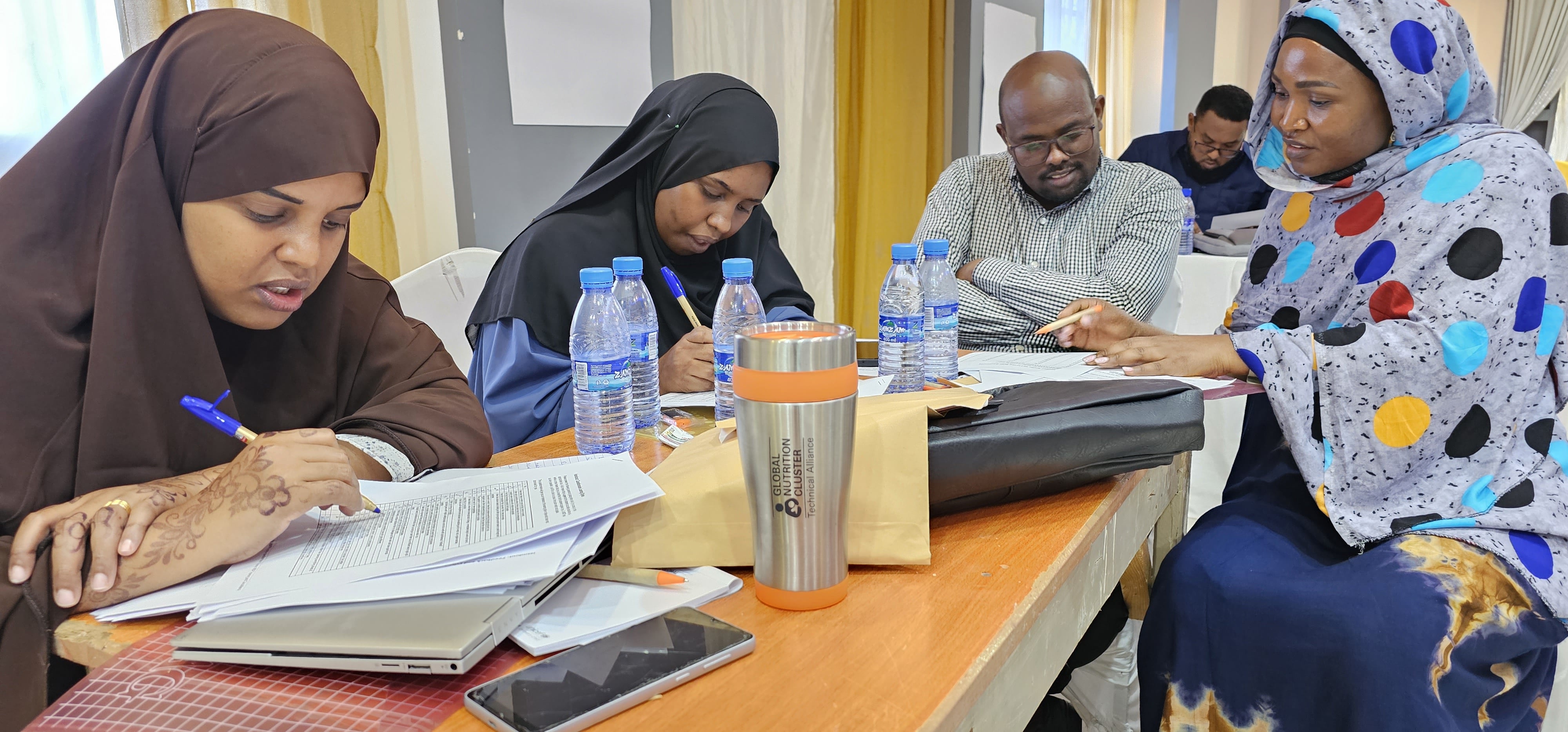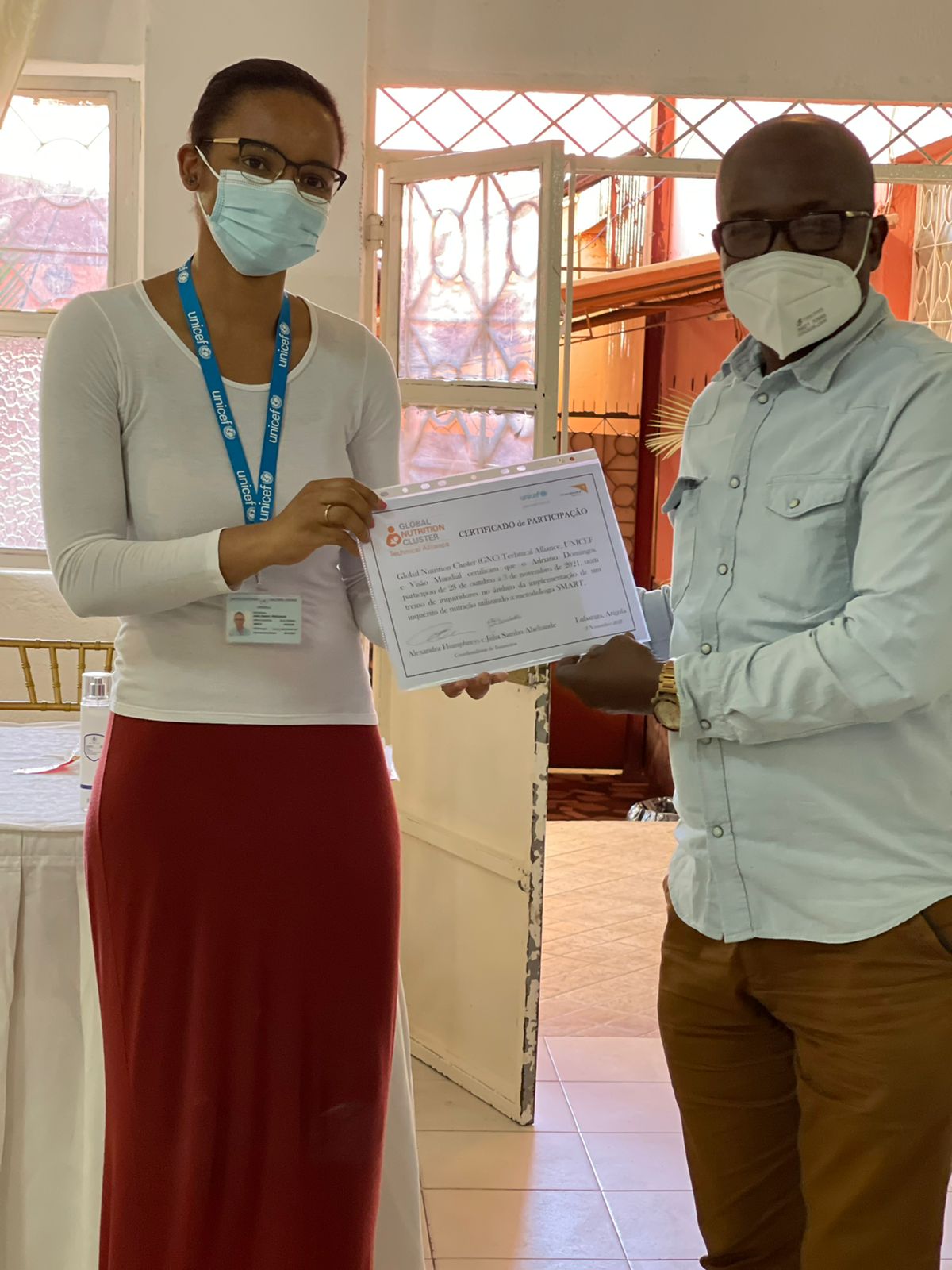Request support on coordination, information management, integration for nutrition outcomes or technical nutrition in emergencies assistance.
التماس الدعم لتنسيق التغذية وإدارة المعلومات والتغذية في حالات الطوارئ
Demander un appui pour la coordination de la nutrition, la gestion de l'information et la nutrition dans les situations d'urgence
Buscar apoyo para la coordinación de la nutrición, la gestión de la información y la nutrición en situaciones de emergencia
Solicite apoio para coordenação em nutrição, gestão de informação e nutrição em emergências

How We Prioritise Local Expertise
As part of our journey, the TST has identified some lessons learned around our efforts to prioritise local and regional expertise in the provision of technical support. Part of our learning was around exploring the value of contextual expertise as well as technical expertise when providing support to countries. We aim to continue strengthening this approach in the future.
Background and introduction
Co-led by UNICEF and Save the Children, the Global Nutrition Cluster (GNC) Technical Alliance is an initiative to improve the quality of nutrition in emergency preparedness, response, and recovery by bringing together many nutrition organisations. Among these, the GNC, Action Against Hunger Canada, UNICEF, International Medical Corps (IMC), Save the Children International, and Action Against Hunger US host more than 20 individuals who make up the Technical Support Team (TST). The TST provides coordination and technical support to nutrition practitioners either remotely or in-country as well as providing vetted consultants through a roster.
As part of our anti-racism and localisation journey, the TST has made progress and identified lessons learned around our efforts to prioritise local expertise in the provision of technical support.
Why is prioritising local expertise important?
Prioritising local expertise is important because it centres our work around local and national practitioners, the folks who are always the first responders in an emergency. For the TST, we began by acknowledging that within the humanitarian and development sectors there exist assumptions that are detrimental to the work and wellbeing of actors in the ‘Global South’[1]. Some of the assumptions we discussed as a team included the following:
- The idea that white ‘Global North’ actors are more readily seen as ‘experts’
- The notion that international actors are unbiased actors
- The idea that national actors in the 'Global South' lack capacity and expertise
- The notion that national actors can and should be paid less than international actors
- The idea that hardship is natural for national actors but unnatural for international actors
We openly discussed these assumptions and began to deconstruct them, in particular thanks to the work of Peace Direct and their report Time to Decolonise Aid. In this report, which was based on a three-day online consultation with 158 activists, decision-makers, academics, journalists and practitioners across the globe, one actor spoke to the importance of ‘contextual expertise’ in the following excerpt:
“Many NGOs for example, hire ‘technical expertise’ rather than ‘contextual expertise’, which – intentionally or otherwise – gives international staff an advantage over national staff … even though so many of the solutions to many complex issues will be found through an understanding of the context, rather than the theory. There is somehow an assumption that context can be learned (by international staff), but that the theory etc. can’t (by national staff).”
Thus, both contextual expertise and technical expertise became interwoven into our thinking and discussions around the importance of prioritising local expertise in our work. After all, the added value of someone providing technical support in a country where they also have strong contextual expertise to contribute (e.g., knowledge of the local language(s), customs, ways of being, communication channels, existing relationships, and partnerships with nutrition actors and beyond) is not something that can be readily strengthened in the way that technical expertise can.
How have we applied prioritising local expertise?
In order to apply the concept, we had to operationalise it. This began with an exercise in defining who would be best positioned to provide both contextual and technical expertise when we provide support to countries. We settled on four different categories or ‘tiers’ that would support our prioritisation exercise:
Tier 1: National actors, including subnational
Tier 2: Regional actors [2]
Tier 3: Global actors with substantial experience in the context
Tier 4: Global actors without experience in the context
Once we had determined these categorisations, it was a question of how to apply them when identifying appropriate human resources (HR) for support to countries. The TST has full-time and part-time staff ns the opportunity to draw upon staff from among the TST partners[3] as well as a list of over 120 vetted consultants to fulfil in-depth support requests as needed. Once the appropriate HR has been identified, this individual acts as a ‘TST Advisor’ for the support. Where possible, we began applying these tiers which allowed us to prioritise advisors with greater contextual expertise for the country of support.
In short, when evaluating potential advisors for a piece of work, in addition to our normal processes [4], we began prioritising the following in the HR selection process:
- National or regional actors (Tiers 1 and 2)
- Knowledge of working language(s) for the context
- Carbon footprint
To note, we have in some cases been able to select a less experienced advisor and built strong technical backstopping or coaching for capacity strengthening into the support. The last consideration of calculating the carbon footprint for the estimated distance the advisor would need to travel to deliver the support came by way of a recommendation from the TST Climate Change Working Group, which nicely complements a more localised approach.
What have been our successes?
By shifting our thinking about expertise to include both contextual and technical, we have been able to more meaningfully prioritise local expertise. Here are some examples of local or regional advisors from 2020-2022:
- Advisor from Uganda supporting NiE in Somalia
- Advisors from Ethiopia and Kenya supporting NIS in Tigray
- Advisor from Mozambique providing Assessment support to Angola
- Advisor from Bangladesh providing NIS support to Myanmar
- Advisor from Guatemala providing IYCF-E support to Honduras
- Advisor from Colombia providing IYCF-E support to Nicaragua
- Advisor from Tanzania providing NiE support to Ethiopia
- Advisor from Uganda supporting CMAM in Somalia
- Team of Advisors from Somalia supporting CMAM in Somalia (twice)
- Advisor from Guatemala providing Assessment support to Bolivia
In most cases the providers of technical support were from the region and/or a neighbouring country.

What have been the challenges?
One of the earliest challenges was in shifting mindsets, first our own and then among our requestors of support. It feels like the instinct is still for countries to request global level actors with the assumption that they bring with them better capacity and greater authority in leading and validating nutrition activities. In some cases, it has required spending more time discussing the needs and framing the value of contextual expertise for us to be able to proceed with prioritising national or regional actors. In other cases, it has been very welcomed, particularly in Latin America, where identifying consultants who are native Spanish speakers has been very appreciated.
In some countries, especially for consultants, we do not have a diverse pool of potential advisors available through the consultant roster or we are not well connected to national communication channels to advertise consultancies.
Many resource and coordination materials are available only in English or French. Therefore, advisors often spend a lot of time having to translate materials into other more applicable languages. We hope to continually expand on the languages that our tools and guidance are available in.
The TST systematically assigns a technical backstop for all advisors. However, in some cases these technical backstops don't speak the same language as the advisor or read the language the deliverables are being produced in. This can create some barriers and we need to provide the necessary resources to overcome these as needed.
Although we are proud of prioritising local and regional advisors to provide both contextual and technical support to countries, we have sometimes found it uncomfortable to explain to a global candidate that was not selected that this was one of the factors. We hope to mitigate this by making this prioritisation clearer from the start and being more transparent in our selection process.
This prioritisation approach is not yet being applied across all areas of TST support.
What are our aspirations for the future?
The TST has made strides in hiring consultants from the same region where support is provided, but we would like to do a better job of hiring national actors for the work. Ideally, we should see an increase in the percentage of support that is provided by national consultants over time.
In the future we would like to further the controversial discussion around the national vs. international pay gap. As the humanitarian system is structured now, there are financial incentives for actors to cross a border into a neighbouring country where they can receive an ‘expat’ salary. Why not pay national actors at this same base rate in a context where they have the most contextual expertise to provide and can still live and work more closely to their families? In the future, we aspire to standardise base rates across consultants based on expertise and the piece of work, not based on an individual’s nationality.
Our aim as the TST is to formally adopt this commitment to prioritising local expertise so that we can more consistently acknowledge and act on the added value of contextual expertise. Fulfilling this commitment would in turn require us to broaden our communication channels, produce tools and guidance in more languages, and communicate our intentions externally to the nutrition sector.
Lessons learned
- There are often national and regional actors with both technical and contextual expertise relevant to the technical needs in-country
- We as a global mechanism need to do a better job of connecting with available expertise in the countries where we provide support
- Shifting from the standard practice of using global actors to prioritising national and regional actors was straight forward to implement, but required flexible funding, drawing on a wider pool of potential advisors, and advocacy
Authors: Alexandra Humphreys (AAH CA, Anti-racism & Localisation Working Group co-chair), Martha Nakakande (IMC, Anti-racism & Localisation Working Group co-chair), Ben Allen (UNICEF), Philimon Majwa (UNICEF), Aurélie Salvaire (UNICEF)
Acknowledgements: Colleen Emary (World Vision), Andi Kendle (AAH CA)
[1] We acknowledge that the term ‘Global South’ is an imperfect term that is top-down in nature and will likely be replaced in the future
[2] Continental regional, especially geographically neighbouring countries
[3] A group of 20 partners available to provide technical assistance upon demand.
[4] Requester preference, the strength and appropriateness of the profile for the request, timing of support need and availability of resource, the necessary administrative process and required urgency
